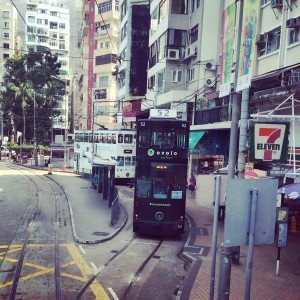Lisa Niver's Blog: We Said Go Travel, page 355
November 10, 2014
A Nice Pick-Me-Up in Croatia
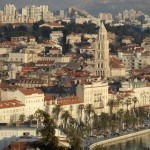
After three months on the road by myself, I have to admit that I was flagging. I had a lot of time to think on the 8 hour bus ride – from Mostar, in Bosnia-Herzegovina, to Split, in Croatia – and I was mostly thinking about throwing in the towel.
Don’t get me wrong, I loved travelling. I still do. Those three months had been some of the happiest of my life, and, although I didn’t know this at the time, the next three would be even better. But, still, three months away from everything – from family, friends, a normal life and proper diet, well it takes its toll. Inexplicably the thing I missed most was probably a good old British sausage.
And so, after three months of jaunting around continental Europe, I wondered if it was time to cut my losses and head home. A friend was flying out to visit me when I got to Zagreb. Why not just fly home with her?
At this point I would like to make it clear that this decision is in no way a reflection on Bosnia. Sarajevo and Mostar were wonderful cities, and I’m not sure if I met a more friendly and welcoming people in the whole of my trip, but for some reason it wasn’t enough to keep me going.
I sat, glumly, on the bus, watching the grey Bosnian countryside go by, thinking about the implications of the decision. I wondered what it would take to get me out of the slump, to drive me on to finish my trip.
The answer, it turned out, was Croatia. Almost as soon as we had crossed the border I noticed a change in scenery. The grey, blasted mountainsides of Bosnia, while beautiful in their own way, were replaced by Aegean coastal vistas. The grey became green, the drab, Central European style of housing made way for terracotta-roofed villas. My frown was replaced by a smile. I knew, immediately, that I was going to like it here.
As the bus trundled up the coast, my mood was immediately lifted. Friends had told me about how great Croatia was in the past, but for some reason it took actually being there in order for me to believe them.
If the bus ride planted that seed in my head, arriving in Split was the confirmation that helped it blossom in to a love for the country. Even just after stepping off the bus it was easy to see how beautiful a city it was.
Diocletian’s palace, which has been standing in one form or another since the 4th century, towers over the harbour as you disembark. The white marble walls gleam in the almost perpetual sunshine, and a cool breeze blows off the Aegean. Even though I was there in the middle of January, I could not have been blamed for thinking it was a pleasant April’s afternoon.
Normally when I was travelling I tended to make a beeline for my hostel, in order to set up a base camp of sorts before going and exploring. This time was different. I was so taken by the city spread out before me that I spent an hour wandering around the inside of the palace walls, which now serve as the boundary of the old town.
Somehow, Split single handedly dragged me out of my funk and put me back on course. I really believe that if I had skipped it and gone straight to Zagreb that I may have packed the whole thing in, but I’m glad I didn’t. When I got to split one of my first thoughts was ‘I can’t quit now, what if I miss another place that is as amazing as this?’
I have since been back to Split, and have to say that once you go a bit beyond the old town, in to the main city itself, it loses the magic somewhat. However, I challenge you to show me a city, besides perhaps Venice, that doesn’t lose some of its charm when you get away from the main attractions.
Even so, I still owe the city a huge debt of gratitude, because without it I would not have gone on to visit any of the other wonderful places I went to in the second half of my trip. Nor would I have met some people that I am still honoured to this day to call my friends.
But why should you take my word for it? Do what I did and go and check it out for yourself. Then you can see first hand all the wonders that Croatia has to offer.
Thank you for reading and commenting. Please enter the Gratitude Travel Writing competition and tell your story.
The post A Nice Pick-Me-Up in Croatia appeared first on We Said Go Travel.
Travel Without Stress at the Airport
ASK THE EXPERTS: While all of us look forward to going on holiday, the one issue that many will have to overcome is the airport. With an incomprehensible number of people travelling through airports across the world each and every day, it’s hardly surprising that they have become renowned as a stressful experience.
With this in mind, we called upon the expertise of some seasoned travel bloggers to find out how they cope with the waiting around before the departure gate. For starters you could read this article!
Lisa Niver
Having travelled to more than 100 countries, Lisa Niver of We Said Go Travel is another expert when it comes to the airport. Her top tip is to arrive with plenty of time to spare, allowing you to relax and tuck into a good book while you wait:
“My best tip for coping with airports is to arrive early and have great new books on my Kindle. I feel stressed in airports if I am worried about missing my flight so I plan extra time into my day. I also look at the flight connections and if it is too short, I might pick a different routing. I love to read when I travel so I charge up my Kindle and often get great books from the digital public library.”
The Wandering Educators
Dr Jessie Voigts of Wandering Educators says that distraction is her favourite method:
“You have to approach airports with a different mindset than you might expect. Think of it as a game! You’re trying to level up (by getting to your destination), power up (eating well, resting when you can), go sure and steady, and be in it for the long haul despite diversions.
Once you reframe, it’s much easier to cope with stressful situations (and people). When things are the worst, I imagine my calmness nabbing those airport pacman ghosts of stress.”
The post Travel Without Stress at the Airport appeared first on We Said Go Travel.
November 9, 2014
Still Water in Brazil

I’ve heard it said that you can’t ever step in the same river twice, but I never really understood that saying until Brasilia. A city that was tailor made for the future, that would never need to grow or change, and yet somehow defied everything around it. It changed without changing, a constantly different constant, just as you are always you, but you are never the same you that you were 10 minutes ago. I lived in many different countries throughout my life, but somehow I am always drawn back to one city in particular. My river.
Some 50-odd years ago Brazilian president Jucelino Kubitschek decided it would be a good idea to move the country’s capital from Rio, in the South-east, to a more centralized position. After mapping out a spot as close to the centre of the nation as possible, which also happened to be the middle of nowhere, he set about building. Thus, the city was born; thoroughly planned out with sterile, post-modern architecture and constructed in the shape of an aeroplane. To soften the regions harsh dry weather a reservoir was built right at the plane’s nose, as if to prevent it from ever taking off. A still, silent lake, surrounding what was meant to be a still, silent town.
But the city didn’t care for man-made barriers, sooner or later it learned to swim across the lake and stretch out under the sun. New structures sprouted up through the dirt, filling wide open spaces with noise. Bridges tip-toed their way across the water and reached out their stiff concrete fingers towards the eager houses that had been consorting on the other side. Even the landscape of its peoples changed. It had been built to house mostly government officials but now it made room for bakers, engineers, graphic designers, salesmen, fast food chains and even beggars.
Yet there is something stagnant about it all. Something that always resists the change around it. The very lake bed harbours remnants of a past long before the city. Of a forest and farmlands swallowed whole by the river as the dam blocked its passage. Reminding sailors, windsurfers and paddle-boarders, of the hazards from the past, hidden in its depths. A past mummified by still water.
It reminds me that there is always a way to triumph in face of the odds. That change is inevitable. That weeds can grow even in the best kept gardens. Even the water in a reservoir is refreshed every so often.
This is where I feel motivated to push forward regardless of what barriers stand in my way. Where the sterile white buildings are my canvases to paint on. Where normal and constant are consistently redefined. Where the strict organization of each districts seems chaotic in its own way.
Brasilia paved the streets of my mind. Constantly trying to plan, to make sense of life, to add order and logic to the chaos that inevitably dominates. To define the undefinable. In it I can drive around my thoughts and understand the movement of still water and the deception of stagnation. When I’m there I understand that I never land in the same city twice. And that even in the most rigid place on Earth, the water is never quite the same, and neither are the two feet that step in it.
About the Author: Amanda is a recent graduate in Film, TV and Media Studies from the University of Auckland in New Zealand. She has spent her whole life traveling and still hasn’t quite learned how to stay put…
Thank you for reading and commenting. Please enter the Gratitude Travel Writing competition and tell your story.
The post Still Water in Brazil appeared first on We Said Go Travel.
November 8, 2014
Back to the Roots in Nigeria

Travel is said to be a great part of learning. Basically, travel is either for business or pleasure and rarely both. This time I travelled for the latter (tourism), to go and see what life looks like outside the city. Born and brought up in the city of Makurdi, capital of one of the North Central states of Nigeria. I often got mystified when conditions of rural dwellers were narrated. Most times I nod in the gist to the comfort of the teller while convincing myself that those tales were merely exaggerated to gain audience.
Come the fall of 2012, I decided to see for myself. As widely known, ‘charity begins at home’, I took a trip to Echori, a village in Obi local of same state, notorious for its savage lands. The trip was not in short of enthusiasm as can be expected of any tourist expedition. We took time preparing for the journey; got clothes, lamps and batteries, candles, knives, water sacks. it was similar to preparing for a journey into the jungle.
We got to a junction from which a dirt road branched off. The driver turned to us and said, “This is the farthest I can go”.
Our heart skipped as we got down and pondered on what next. I almost forgot to say I went with a friend, just in case. Two motorcyclists came and stopped.
“Where una dey go?” One of them asked in broken English.
“We want to get to Echori,” I said, “How much?”
“Oga, two of you seven hundred but one person na five hundred,” the motorcyclist explained.
We hired the two in the end. As we went deeper into what seemed like a forest, we met other cyclist plying the road. I was convinced my thoughts had demeaned the exaggerated gory tales of rural dwellers. A village with such huge number of motorcycles must be more civilized than speculated. Isn’t it?
Further in, we were greeted with houses made of mud bricks – not plastered – and rusty zincs or thatches. The road was uneven and pure mud. at some point, we had to climb down for the bike to navigate through very rough spots before we climbed on again. That moment, the reality of how wrong I might have been hit me. On arrival, at the place the cyclists advised us to go because we could easily get accommodation, children rounded us – most of them cladded only on dirty pants. I tried to reach out and touch some of them but they ran away only to recycle us shortly after.
We intended spending a week but realism cut the tour to two days: the only borehole – manual by the way – released only one bucket of water every three hours, there was nothing like electricity because they were cut off from national grid, the houses where apologetic. There was no way I could endure longer, no matter how hard I tried.
Besides the odd stories, good stories also abound: as little as two hundred naira could prepare you a sumptuous full pot of nutritious soup because of the low cost of living, and I also enjoyed fruits and ample fresh air at some parts – although some parts used smells of decaying feaces because of the open defication they practiced.
What captivated me the most was how little children would poo-poo and rub their butt on sand afterward. We took photographs of the kids, albeit they were shy at first. When we prepared to leave, we left behind cutlery, toiletries, clothes and so on. At least am sure they’ve had the experience of wiping their butt with tissue paper till I return – that is, IF I would ever return.
Thank you for reading and commenting. Please enter the Gratitude Travel Writing competition and tell your story.
The post Back to the Roots in Nigeria appeared first on We Said Go Travel.
Searching for trams in Hong Kong
One of my favorite things about living in Hong Kong was traveling an hour south from my home to see the trams glide up and down the northern part of Hong Kong Island. So when I returned to Hong Kong two years ago for the first time in fourteen years, I made sure my husband Tom and I saw the trams.
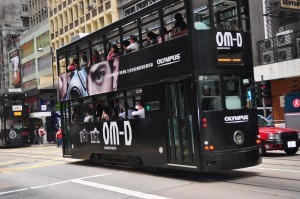
photo by Tom Kason
Traveling by tram isn’t always the quickest mode of transportation in Hong Kong, but it’s a reliable one. Only the trams run on the tram lines, so there’s no competing with double-decker buses, red taxis, cars, or trucks. On our last day of that trip two years ago, we spent the morning riding a couple of trams lines and saw different neighborhoods, including Wanchai and Causeway Bay.
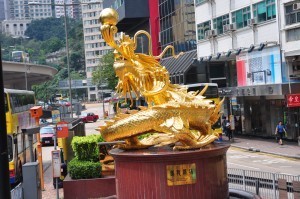
photo by Tom Kason
So when we decided to return to Hong Kong this fall for another quick trip to promote my memoir, Good Chinese Wife, I had the brilliant idea of staying in the area where Happy Valley, Causeway Bay, and Wanchai intersect. My plan was this: we would travel by tram to and from our hotel (shown in the photo above just to the right of the greenery). It would be relaxing to hop on a tram and sit back while it sauntered along the track to a subway station or a destination we could reach on the tram line.
But then Occupy started a couple weeks before our arrival date. Thousands of students took to the streets to protest the lack of democratic representation. Although they didn’t set up their tents that close to our hotel, the barricaded roads affected many modes of transportation on Hong Kong Island. Trams included.
In fact, on the night we arrived in Hong Kong, I asked the concierge at our hotel if we could take the tram out front to a subway station. He didn’t go into any details, but simply said that the trams weren’t running because of the ‘events’ in Central.
“But aren’t the trams running around in this area?” I asked, half panicking that my grand plans were about to be squashed.
“No, sorry. No trams.”
I thanked him and turned back toward Tom. We went to our room, activated our free wifi, and found out from a friend that the trams around Happy Valley, where we were staying, had started running again.
So we would get in a tram ride on this trip, I sighed in relief. But it still wasn’t what I’d envisioned when I booked the Cosmopolitan Hotel (which, for history buffs or people who enjoy quirky facts, used to house the de facto consulate of the People’s Republic of China back during the days when Hong Kong was a British colony).
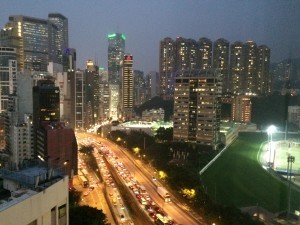
View from the Cosmopolitan Hotel
The next morning we figured out how to get to other parts of Hong Kong without riding the trams. I was still sad we couldn’t just hop a tram in front of our hotel. But I’d soon learn a lesson about what it means to live in Hong Kong these days.
Traffic was congested, especially during rush hour. We had to leave our hotel an hour before we needed to be somewhere that usually took only fifteen minutes to reach. I was amazed by how calm and accommodating people in Hong Kong were when it came to these changes in transportation. After all, they’re used to living in one of the most convenient and efficient cities in the world. If Hong Kong people can handle it, I certainly could. And we would do our best to ride the trams when we could.
More tram lines opened toward the end of our four-day trip.
And on our last night, we were finally able to take a tram from Central back to our hotel.
Looking back on this recent trip to Hong Kong, I’m so glad we were able to see Occupy and experience what people in Hong Kong now have to deal with on a daily basis. So we didn’t get to take the trams as much as I had envisioned, but we got our fill and had wonderful trip nonetheless.
The post Searching for trams in Hong Kong appeared first on We Said Go Travel.
November 7, 2014
Going Global: An Observation of Privilege

To the avid travelers, frequent movers, nomads, and vagabonds in this world, acquiring the necessary visas before a trip is pretty standard. As the Million Ways to Live project draws near, I too have had to spend a decent amount of effort on this very subject. We are planning to visit over 30 countries over the next year, and of course, some of them require visa prior to arrival.
This is the interesting bit: when I tell my friends about the visa process, I encounter 2 distinct reactions. Both contain a bit of surprise, but one is coupled with lament, the other envy. To my U.S. friends, the common response was “Oh yeah, I never thought about that” followed by “that must be tiresome”. They were sharing in my supposed discontent over obtaining these documents, which I didn’t really feel. All in all, I only needed to get three visas: Brazil, India, and China. This to me seems enormously convenient, but as I learned, it’s all very relative. To many people I know, particularly ones who haven’t been to a country with a visa requirement, it seems cumbersome to even need to get one. To quote my friend, “if you think about it, it’s all just made up by people.”
On the other hand, when I tell my Indian friends about the visas I need to get, the overwhelming reaction is “you only need three?!” To them, visa application is a laborious process, since they need to get one for almost every country they wish to visit. One jokingly said, “If I were to try this, some of my visas would expire before I actually got all of them”. This is the reality for the vast majority of people in this world. To the billions of Asians, Latin Americans, Arabs, and Africans, traveling isn’t as simple as buying an airline ticket and having a “can-do” attitude. There are enormous difficulties getting into some countries, and the processes are often as insulting as they are arbitrary.
The topic of “White Privilege” has been on people’s minds lately. To me, beyond just White Privilege (or White Heterosexual Male Privilege, to be specific), there is also such a thing as “First World Privilege” that we all share. While White Privilege is a phenomenon easily observable in the U.S. due to our enormous racial diversity, First World Privilege is something that can only be seen on a global scale. It can be invisible to citizens of the First World the same way White Privilege can seem non-existent to white people. If you’ve only traveled as a First World citizen, especially if only to other First World nations, likely you’ve never really encountered it. It’s reasonable to expect to arrive at Customs and receive a stamp on the passport. That’s the norm, the status quo. Truth is, it isn’t.
Now, border controls and custom checks – inconvenient and unreasonable as they usually are – obviously exist for a reason. I’m certainly not saying they shouldn’t be there. But I am saying that if you ever need evidence of privilege, go to one and see how people from different countries get treated upon arrival. The meaning of privilege, to me, is that by being a member of a certain group, you automatically, through no necessary merit of your own, get access to things that are either very difficult or flat out impossible to obtain for members outside of that group. We, as citizens of the United States, enjoy a huge amount of privileges when traveling, and for the most part we’re oblivious to it.
If you need more evidence, think about this: as a U.S. citizen, out of the 195 sovereign states in this world, you can visit 174 of them without obtaining a visa prior to arrival. The only other nations with that kind of travel freedom are U.K., Germany, Sweden, and Finland, all European. Falling a bit behind is Japan, with 172 countries. If you are an Indian citizen, that number goes down to 52, while Chinese citizens have only 45. Think about that for a second. You can be anyone from the United States: black, white, rich, poor, it doesn’t matter. As long as you have a valid passport, 174 countries will open their doors to you, basically hassle free. On the flip side, if you’re Indian or Pakistani, you can win the Nobel Peace Prize, but before you can claim it, you first need a trip to the Swedish consulate. Privileges are very real, but they are also subtle, especially to the privileged. We enjoy them everyday, usually unaware that things can be different. I don’t think we need to feel guilty, but we certainly should feel #blessed.
The post Going Global: An Observation of Privilege appeared first on We Said Go Travel.
Seventh Heaven in South Africa

As I stood on the shore, uncertain of myself, I faltered and curled my toes into the wet, cold sand.
Had I really come this far?
Seventh Heaven in South Africa
I looked up at the horizon and watched as the frothy green waves rolled in heavily and crashed at my feet whilst mountains rose in the background on the other side of False Bay. The icy chill of the water on my toes brought me back to my senses and the realisation that yes it was me and I had made it that far. I was standing at the bottom of the world and I had never felt more thankful for every step that brought me to that moment. I had overcome hurdles that felt like mountains, injuries that left me broken and there I was still leading a life of travel and following my dreams. In spite of my fears and uncertainty, I had taken a leap of faith and left my home to find out what lay beyond all that I knew to be safe, secure and routine. I had longed to find out how people lived, laughed and explored on the other side of it all. I swirled my big toe amongst the broken, pearlescent mussel shells and my heart swelled with gratitude. I had done it.
There is nowhere that leaves me feeling more myself than when I am underwater with sharks. Those masters of the ocean leave me peaceful, calm and incredibly grateful for life when they grace me with their presence. As I stood on that shore swirling my toe I remembered my love for the ocean and took considered and cautious steps into the water. For the first time in months I was able to swim unaided. I tripped over smooth boulders unseen below the sandy surf and the cold took my breath away. I barely had time to register the incoming waves as I fell onto my front, laughing and weightless, and was pain free at last. As I drifted past the waves and onto the kelp forest below me my hands were already numb, my heart was racing and I couldn’t stop smiling. My dive partner took my hand gently and we descended onto my favourite dive site in the world; my real home, my bliss. My recovery milestone I had been working towards all those long months.
The thick kelp forest swayed back and forth around me as we sank like stones and the sunlight shone down amongst the fronds of kelp and dappled the sand below. I was floating in an underwater forest of light and pure unadulterated life. There were rotund pink snails nestled amongst the kelp and urchins dotted across the boulders; pin cushions of every shade of purple, grey and green imaginable. A bright orange starfish stood out amongst them all as we glided past and left just a trail of bubbles behind. Sea slugs hid in crevices, tucked away from the current, their colours bright and luminescent against the dark of the seaweed around them. I arched my back and felt the water support me as I gazed at the surface above me, sparkling and glistening as the waves rolled on rhythmically.
As we came to rest at the empty sand patch within the reef, I waited with anticipation. I knew this was where the Sevengill sharks lived and, if they were feeling curious, would visit us. I breathed quietly, clasped my cold hands together upon my lap and said silent prayers for the sharks to come. I sat like a child waiting for Christmas as my hair drifted around me and swirled in front of my mask like a passing cloud. I was desperate to see the beauty of those sharks and I needn’t have been concerned. Within minutes one floated gently out of the gloom with a slight swish of his tail. He was bold and curious and slowly passed me within touching distance as he watched me with his round eye. He turned away from me at the last moment and I could see his beautiful grey skin was dotted with white freckles. His underbelly was white as snow. As he disappeared back into the gloom, perfectly camouflaged within his environment, I let out a loud laugh and squeal of excitement. At last, at long last, I had seen the sharks I had missed so terribly. As I became lost in my excitement a female Sevengill appeared and passed us by. It was absolute perfection and my eyes welled up as I admired her every move.
The chill reached my bones and we had to rejoin the world above. It was all too short and the remainder of the dive passed in a blur as I smiled to myself and ascended. I looked down at the reef below and realised that, in a world full of people, there was still a place to be free. I lifted my head in gratitude to the sunshine and broke the surface of the water to a cloudless sky above.
About the Author: Kathryn is a passionate marine conservationist, freelance writer and blogger. She is using her voice one day at a time to inspire others to explore, travel and create a better future for the oceans and sharks.
Thank you for reading and commenting. Please enter the Gratitude Travel Writing competition and tell your story.
The post Seventh Heaven in South Africa appeared first on We Said Go Travel.
November 6, 2014
A Calling for a Roadtrip in the USA
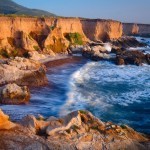
A Calling for a road trip in the USA
This’ll be the third night sleeping in the car. You know you could find a hotel, but somehow you don’t think you deserve it. You wonder if you can keep driving, but that long night in Oregon flashes into your mind, and you’re not really sure you could handle losing another car. Her name was Jenny.
That’ll be the fourth morning not waking up in your bed. Your joints are stiff, and you have to get out to crack them; snap back into life. The world around you is alien. The Mojave is an ocean, but the sand and stone won’t slate your thirst. You wonder how long it’s been since this whole place was under water. You think that you should write; it’s been too long since you opened the dollar store notepad you’ve been abusing as a journal. It sits solemnly in the passenger seat, tempting a hateful glance every ten minutes. But there’s no beauty out there amidst the crags and the cactus. There’s nothing worth writing about. Or there must be, but you just can’t see it. Perhaps the wanderlust has finally taken its toll; maybe all that spinning has worn you away, eroded you like the dry creek beds and those gaping gulleys. You’ve hardened, but that’s what this was all about. You wanted to get to the core. You’re coring. You’re bedrock.
This will be the fifth time today you’ve reached for the journal, and fifth time you’ve closed it before writing a word. You took to the road to find inspiration, but you’re writing less than you were before. Another hasty wind blows you back into the car, and pretty soon the desert is only another image in the mirror. It’s another pronoun titled town, another night without dreams. And the lack of real memory worries you. You think this trip has been a mistake, but the nostalgia also empowers. You know you can’t have come this far for nothing. There must be something out there, at the end of the world, or you wouldn’t need to find it. You will go to the ends of the earth. That place where no soul has dared to tread before, and you will capture it; document the unknown. You will wrest it from oblivion, and take it back with you, or you will fall. Drive off the edge of the earth, or see that it is round, for your own eyes. But you’ve seen so much, you wonder if some of it hasn’t just passed right through you. So many miles, you couldn’t really remember it all. But you do.
Then by the sixth sunset, you find forest. Redwoods, oaks, firs as tall as the tallest building in your podunk Colorado town. The daylight is gone before you get there, but the night doesn’t swallow you up like it has before. Those stars that you held as companion for so many lonely evenings, seem like pale shades of friends, to the towering old world forest; those ancient sentinels of God’s vast imagination. They were here centuries before you were evening an inkling, a twinkling in your father’s eye, and they’ll be here for centuries after you’re nothing but dust, and wind. You hope you should be so lucky to be blown back to this place; this home to the most primordial of giants, this place where life is earliest. You roll down the windows, and let the humid atmosphere wash you. Even so late, and smothered in shadow, the forest is awake as always; it trembles, it catches the wind like no other clime, caressing a simple draft into a symphony of sustenance. The mountains back home are magnificent, but your forests are far less restful. This place is full of deep-rooted enchantment, but you did not come for trees. Tomorrow you will arrive; you can already smell the sea.
On the seventh day you find her. There are no lightning bolts, or choruses of angels descending from the heavens. There is beach, and more water than you thought there could ever be. Perhaps that call that drove you out the door, that call that led the pioneers to perilous years of settling, that call that drove the Spanish explorers to dare an unmapped horizon; perhaps the call was false. But you do not feel false. You sit in the sand, and watch the sun slink down to the edge of the earth. You taste the salty air, and you listen to the ocean. You hear the breath of the world for the first and only time, because you will never forget it, it will never leave you now. You know tomorrow you will head home. Until the next call that is, to some other distant imagined place. But today, you will write.
Thank you for reading and commenting. Please enter the Gratitude Travel Writing competition and tell your story.
The post A Calling for a Roadtrip in the USA appeared first on We Said Go Travel.
What’s your Dream Destination?
What’s your Dream Destination?
While the summer holiday in the sunshine is something we all look forward to, there are some special destination which we all long to visit; special places that offer so much more than a chance to getaway.
We went back to our experts to see if this was the case for even the most intrepid of traveller, with these some of the answers they offered.
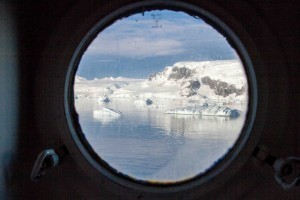 We Said Go Travel – Antarctica
We Said Go Travel – Antarctica
Lisa Niver, founder of We Said Go Travel, said that her dream destination is Antarctica, and a visit would mean that she has visited all seven continents:
“I have never been to Antarctica and it is my final continent to visit. During the seven years, I worked on cruise ships I often thought about sailing to Antarctica. I hope to go in 2015.”
I love Kellie Netherwood’s photos from her trip! Enjoy her article: Click here!
Wandering Educators: Jessie Voigts says:
The second person to name Iceland as a dream holiday spot was Dr Jessie Voigts of the Wandering Educators, highlighting the chance of diving in between the tectonic plates as an experience all travellers should discover.
Where do you dream to go?
Share your story in the comments below or in our Gratitude Travel Writing Contest
The post What’s your Dream Destination? appeared first on We Said Go Travel.
November 5, 2014
Tell Them We Were Beautiful in the Philippines
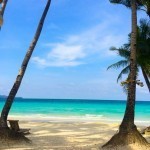
Let’s do something unruly. Let’s get lost in our own selves and brush all the expectations of society aside. I’ll pack the bags and you can swing open the door. We’ll tell everyone where we’ve gone, but they’ll have no way of finding us there. We’ll wander into strange towns with strange buildings and we’ll dawdle down bizarre roads that lead to nowhere but cliffsides. Let’s hang our feet off and ponder why that road was put there to begin with. We’ll create stories of gods, or dragons, or just a lunatic who had nothing else to do but build a road to nowhere. Perhaps he made it for us. Perhaps he, in some feverish dream centuries ago, knew we would find it someday. No one will bother us there: on our secret cliffside. Every place is ours simply because we planted our feet there and only the sound of the wind sharing space with the grass will be our company.
We won’t be alone, though. Never that. We’ll meet many others along the way. We’ll make new best friends from other sides of the world and find true loves that will make us want to live and die; all at the same time. I’ll drink too much unfamiliar wine and you’ll cry about a boy you left behind in our past life. You’ll slowly pick yourself up from the steps you were sitting on and I’ll find my way to the ocean to wash my face. We’ll walk along a beach that no one has bothered to name, creating masterpieces in the sand with each shared step we take.
Let’s be admired for our adventures; our voices shouting loud when we were told that we ought to be silent. We won’t know the meaning of regret nor will we want to. Let’s be remembered for our careless decisions that led us to magical destinations.
They’ll talk about the depth of our smiles. They’ll debate our life choices over their weekly brunch. They’ll all grin with affection when they remember us – thinking about our complete disregard for rules and our courage to dance away. They’ll gaze into the sunlight and wonder where we are, and maybe wish they were there too.
We want to be remembered as those who laughed and loved the way people are supposed to. We want the world to know that we were there and we did something worth living for. We’re going to be great someday. We’re going to be worth talking about.
And if nothing else, they’ll say we were beautiful.
Thank you for reading and commenting. Please enter the Gratitude Travel Writing competition and tell your story.
The post Tell Them We Were Beautiful in the Philippines appeared first on We Said Go Travel.
We Said Go Travel
We Said Go Travel is a global community of over sixteen hundred writers with articles from every continent.
Stories are shared with photos and video from a perspective of the transformative power of travel. We Said Go Travel has hosted live and online events as well as travel writing contests around the world. ...more
- Lisa Niver's profile
- 57 followers




